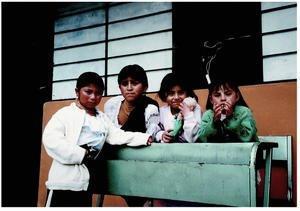Much to my relief, the teachers proposed a replacement: a local man they've just employed as a school caretaker.
So, after a two week gap that left me with a sore back, Jose Manuel took up the hoe and rake. He worked like a maniac – achieving twice what I could in half the time.
The garden has never looked better: not a weed in sight , with immaculate paths between the beds. I worked with Jose Manuel re-digging and re-planting some beds and tried to impart as much as I could about the methods we're using. He is keen to learn and I feel certain the garden will go from strength to strength.
There were more changes this month for the environmental association. The group leaders, or 'dirigentes' should have been re-elected months ago, but weren't. The president didn't want to give up the reins then, nor even into the New Year.
I'd been pushing him to call an election, with support from other members but still he's been reluctant to allow change. Up to a point, he was put off because the decline in member numbers was partly his fault and he was hoping for an upturn to get him off the hook. He knew he'd be under the spotlight during an election, and would have to explain what had happened during his watch.
Anyway, he finally acknowledged the need for a change in leadership, which opened the way for the vice president to call an election. The first election meeting flopped because too few people turned up – not even enough for a quorum.
We called another meeting and I redoubled my efforts in publicising it. This time about 26 members came. They proposed three members for each of the eight posts on the leadership, and we took oral votes from everyone.
It was a curious – and not altogether democratic – process where successive voters were clearly influenced by what previous voters had decided. I kept the scoreboard, counting votes.
The winners weren't always people I'd have chosen myself, but there were several new faces, and everyone seemed happy with the outcome. The one exception was the ex-president, who didn't even pick up a secondary post. Probably just as well.
More practical work tasks this month had me risking life and limb clambering on roof rafters.
Finishing the last extension to the health centre (mentioned in previous missives) was such a rush job that the completed building is extremely flaky. One of its more serious defects is a leaky roof, with rain coming in through four holes caused by clay tiles sliding down from where they'd been laid.
Despite my telling half a dozen people about the problem, and the obvious signs of water damage to plaster and floorboards, no one stepped forward to sort out the tiles. Ultimately, I climbed on the roof myself, with a guy from the community and we rearranged the tiles to block the holes.
I was staggered by how confident my co-roofer was, walking on the rafters. Rafters that seemed to buckle supporting clay tiles, let alone the weight of two adults. He zipped up and down the roof like a cat on a branch, making me feel decidedly cowardly as I moved around slowly, carefully measuring every footstep.
Anyway, we patched up all four holes just in time. The rain fell just as we were climbing down from the roof. The timing was impeccable, testing our tile positioning while we still remembered how the tiles lay. So did the rain come in? Not a drop.
I may soon be moving on from Ecuador, to a new role in the Galapagos. More of that topic next month. But I wouldn't be the only one to be leaving Ecuador for new shores. Ecuador's Central Bank reckons that expat workers sent home $1.2 billion last year – second only to oil as a source of foreign earnings.
Emigration from Ecuador to richer countries is not a new phenomenon. Young, ambitious people have left Ecuador for richer pickings overseas for generations. However, the scale of the exodus seems to be rising as the cost of travel falls relative to other costs. The government also appears to be encouraging people to find work outside the country.
Spain has an open-gates attitude towards Ecuadorian immigrants and has sucked in tens of thousands of people, most of whom find jobs in agriculture or as domestic servants.
Living here in Ecuador, the effect of emigration is startling. Close to half the people I've spoken to wish to leave Ecuador. They're usually just waiting for some offer of work, or just saving up the airfare. But some families sell everything they own to buy their plane ticket.
Source
Building Sustainable Design
Postscript
Dr Jason Palmer, Mojandita, Ecuador




















